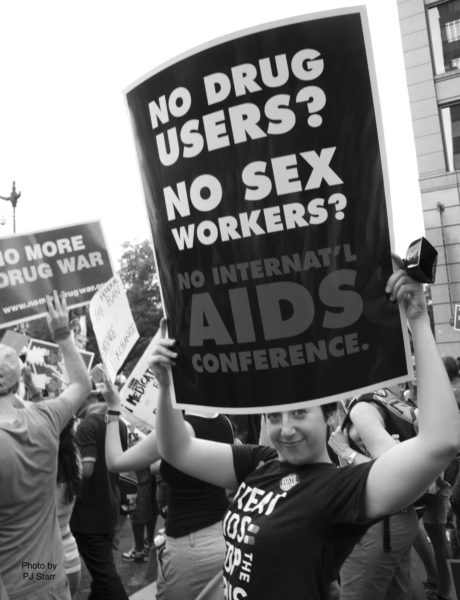It is exciting to see that campaigns to end the criminalization of sex workers’ lives organized and sustained by those directly affected by the laws–that is trans people, people of color, immigrants and youth–are being recognized in major news outlets such as the Washington Post. The coverage of a statement released by D.C.’s Sex Worker Advocates Coalition (SWAC) and DecrimNow DC is needed and brings further national attention to one of the most important movements for change about these issues.
However, WaPo’s article is drenched in language that diminishes the importance of D.C.’s movement and the critical issues regarding race, class, gender, and immigrant status. The authors Narappil and Schmidt write that the “grass-roots effort to decriminalize D.C. sex work hit a major hurdle last fall, when the city council declined to vote on a bill that would make Washington the first U.S. city to eliminate penalties for prostitution” and state that the concerns raised by SWAC and DecrimNow DC “illustrate rifts in the nascent sex-work movement as it tries to move from the fringe to the mainstream.” WaPo must surely know after more than 140 years experience observing and publishing about social movements, that overturning unjust, racist, stigmatizing laws takes time. The debates in 2019 around the bill mark an uptick in interest in this change, a marker along the way in a long campaign, and not a “major hurdle.” If we observe global trends on this issue, change will come. Sex work will be recognized as work. There is nothing “nascent” about sex worker rights. In D.C. the current organizing stretches back directly more than 15 years to coalitions and actions addressing the D.C. Council in regards to the now repealed (due to activism) “prostitution free zone” legislation. The roots of activism in D.C. go much deeper than this with histories of activism that deserve more coverage and celebration in the mainstream press.
The term sex work was coined by California activist Carol Leigh in the 1970s and her work itself is predated by grassroots organizing by people of the stature of Miss Major Griffin-Gracey and many others. Internationally the current phase of sex worker rights organizing has been well respected for 40 years, with sex workers being at the forefront of intersectional struggles for change and working directly with multi-lateral agencies such as UNAIDS and the World Health Organization to develop global policy. Observing the development of a deeply rooted movement in D.C. and describing it as moving “from the fringe to the mainstream” relies on the outdated tropes of respectability politics and racism as to who gets to speak and be taken seriously. This is a sleight of hand to diminish what this movement actually is and the profound changes it is bringing.
The main issue of concern raised by SWAC and DecrimNow DC is in regards to the group Decriminalize Sex Work disrupting local long term organizing and plans. Narappil and Schmidt write that, “Decriminalize Sex Work is facing intense opposition from an unlikely source — the local sex-worker activists who were pushing for the bill in the first place.” There is nothing “unlikely” about SWAC’s and DecrimNow DC’s opposition to an attempted action that was not welcome or appropriate if led by a highly privileged out of town group. Once again, in the 140 years that WaPo has been around, it should be clear by now that people of power and privilege often attempt to hijack long term work done by local activists. And this hijacking results in out of towners reaping the benefits of further funding, recognition, awards and accolades, entrenching the disparities already wrought by criminalization. The years of work that community members have done to celebrate (and prevent the erasure/co-option of) the legacy of trailblazing transwomen at Stonewall should be instructive. Today, activists of color, transgender people and other groups of people who face the devastating impact of criminalization are fully aware of what can happen to a movement and leadership should they not proactively defend their organizing space and legacy.
It should come as no surprise at all that the strategies of SWAC and DecrimNow DC differ from groups such as Decriminalize Sex Work. The SWAC and DecrimNow DC statement is a carefully developed response. Erasing the history of this organizing and pigeonholing activists of color and trans experience as “fringe” is out of touch with how organizing is happening in 2020.











